Abstract
We examined the range and nature of investigators' communication and relationship building as they recruit minority participants in their research. Semistructured, in-depth interviews were conducted with 33 investigators conducting research with human participants. The response rate was 77%. Investigators described several kinds of relationships that are formed or called upon when including minority participants in research. The relationships ranged from study-related, short-term interactions geared solely to facilitate recruitment to others that were longer term, extending beyond a particular project. The data suggest that a range of relationships is important as investigators seek to include minority populations in research. These relationships can both facilitate the recruitment process as well as aid in the interpretation of research findings.
Full text
PDF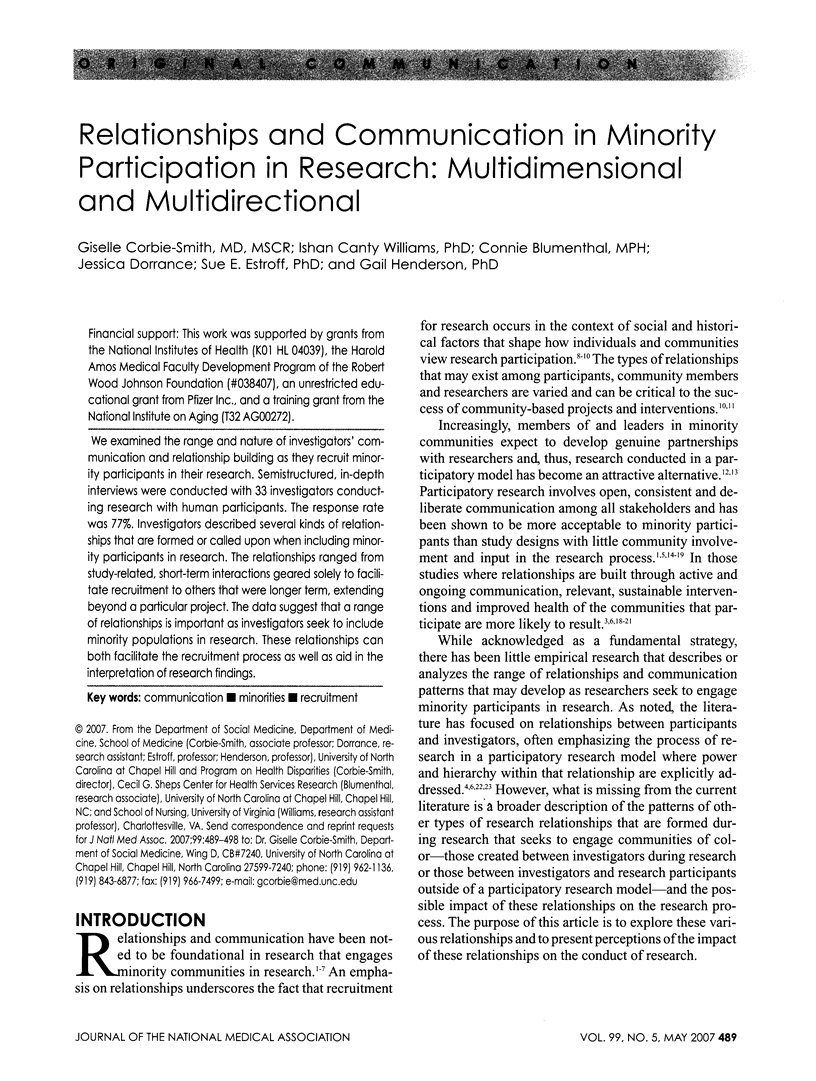
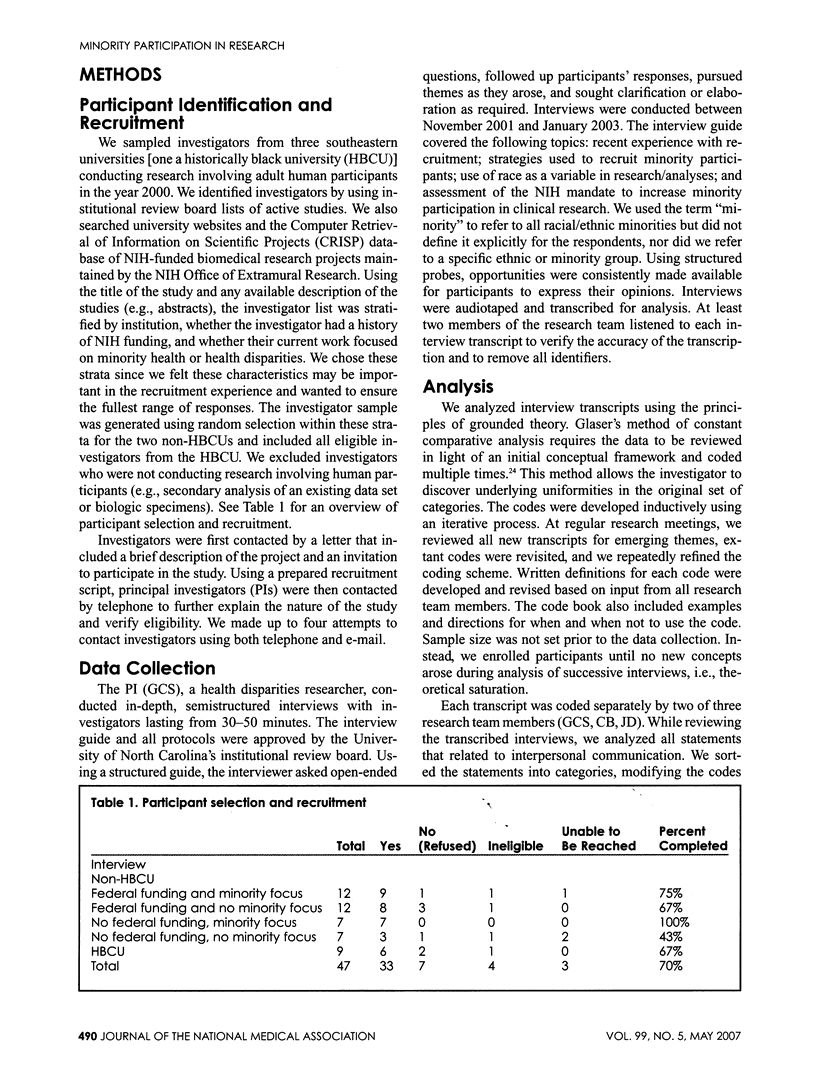
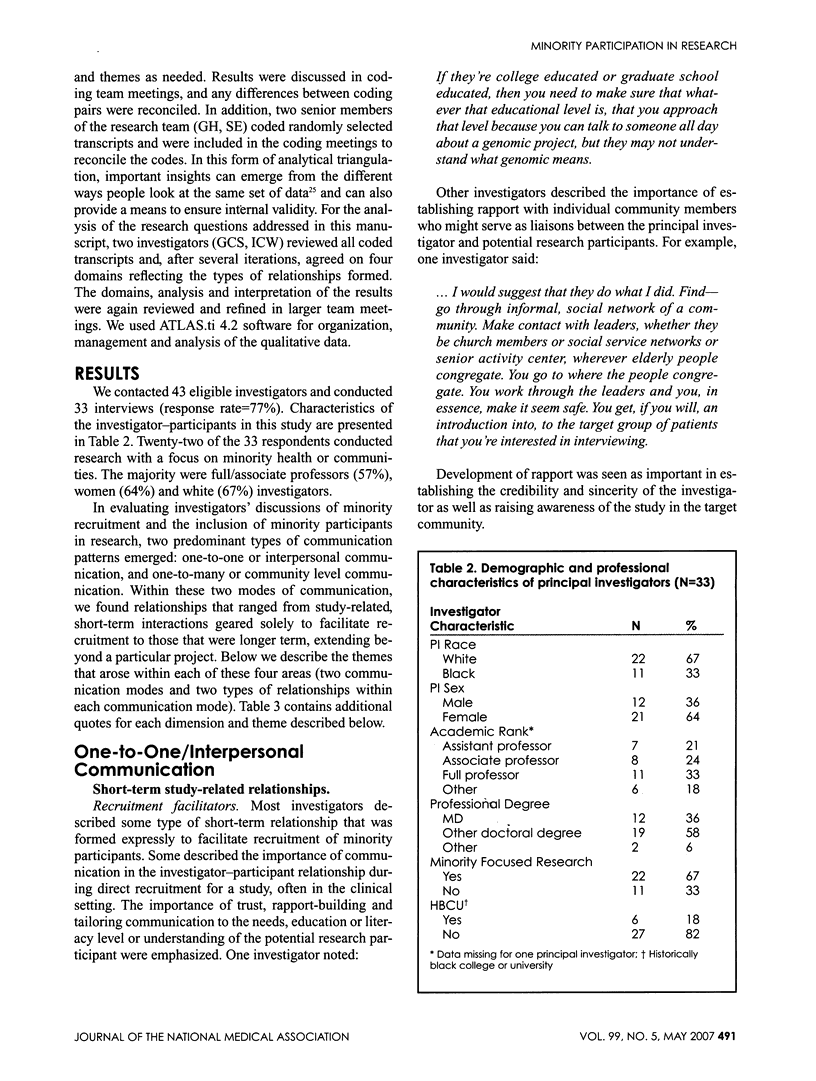
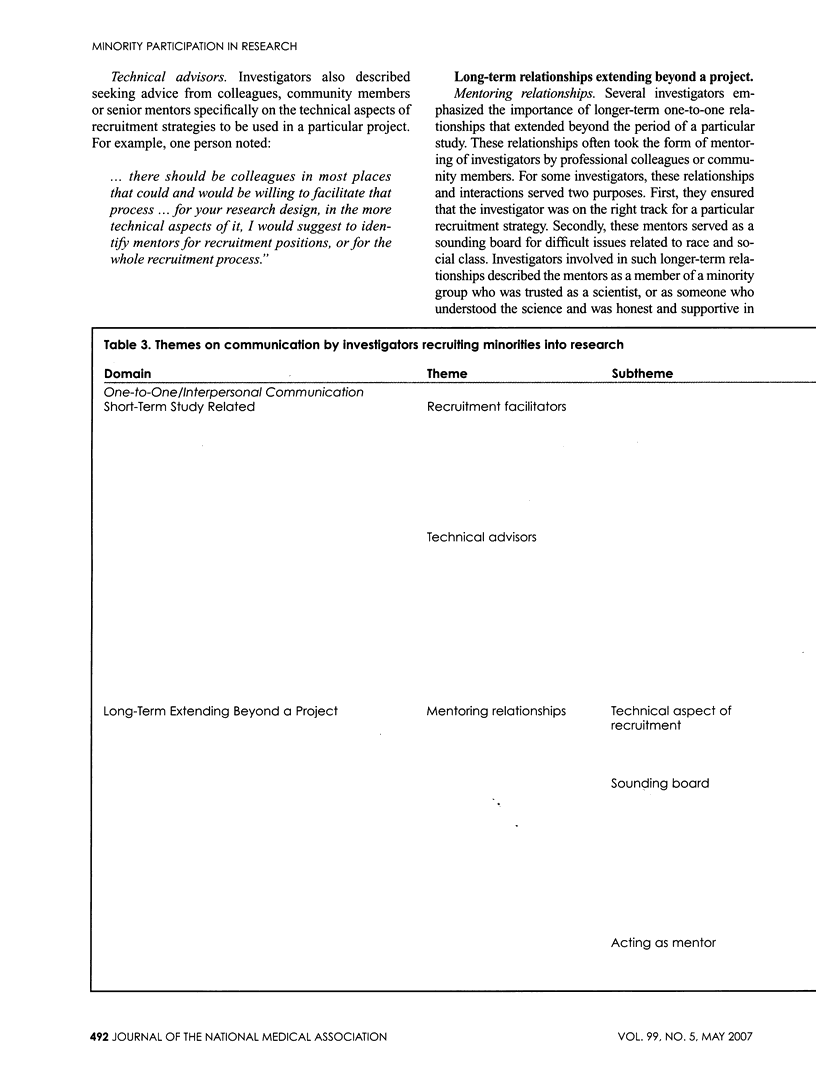
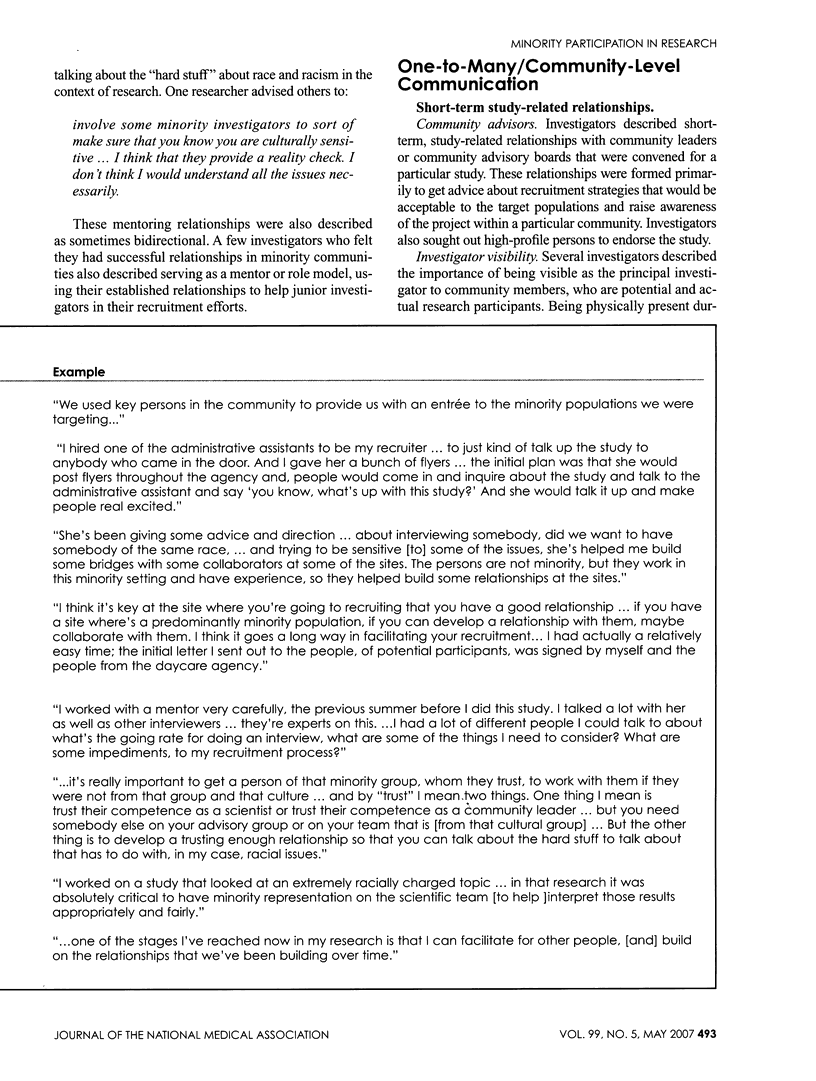
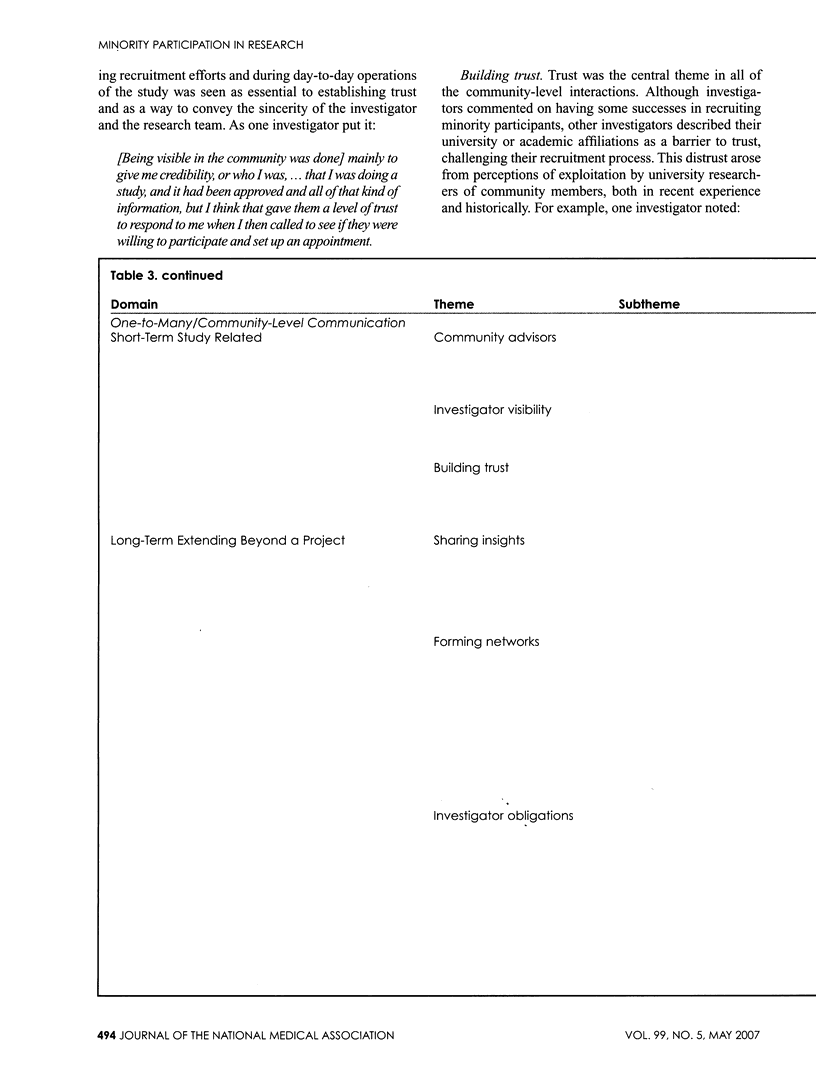
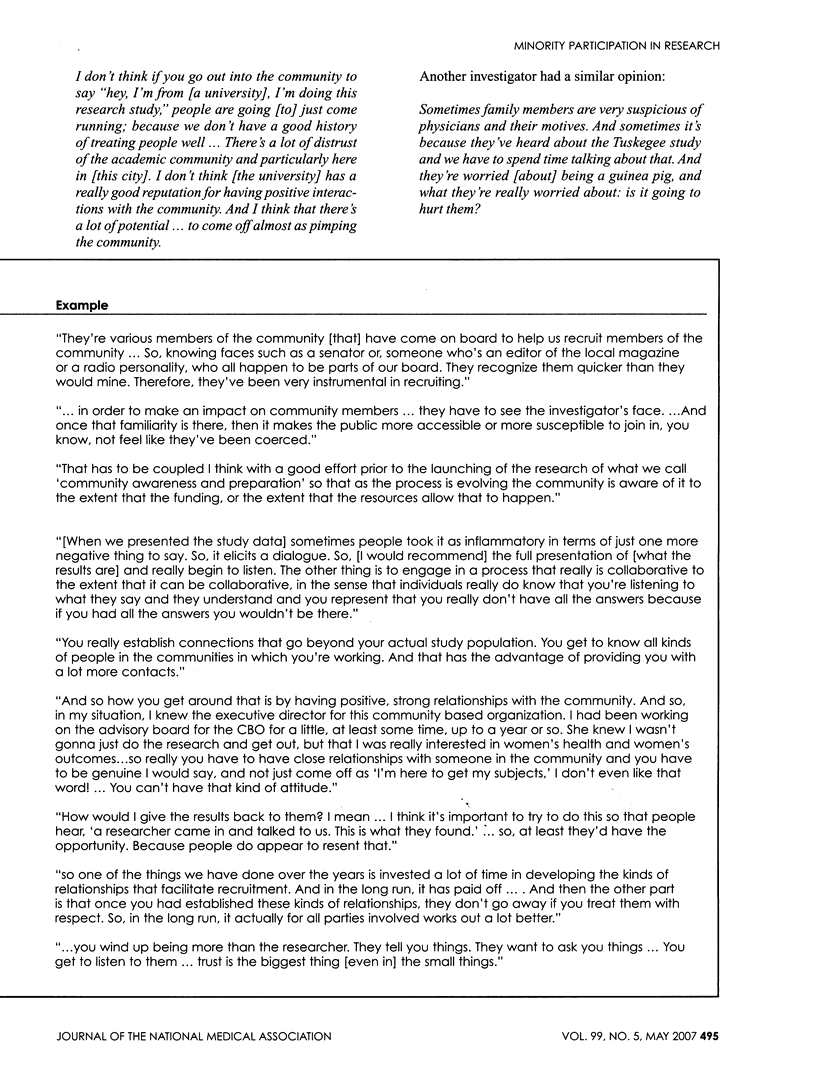
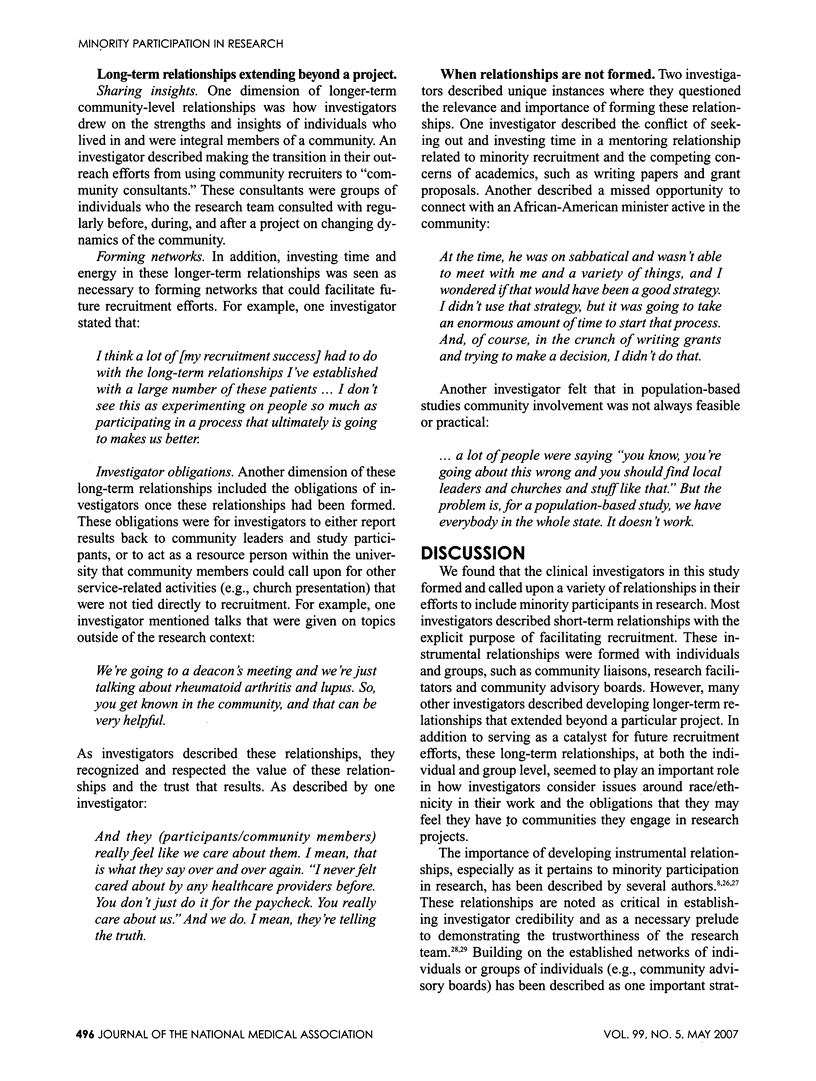
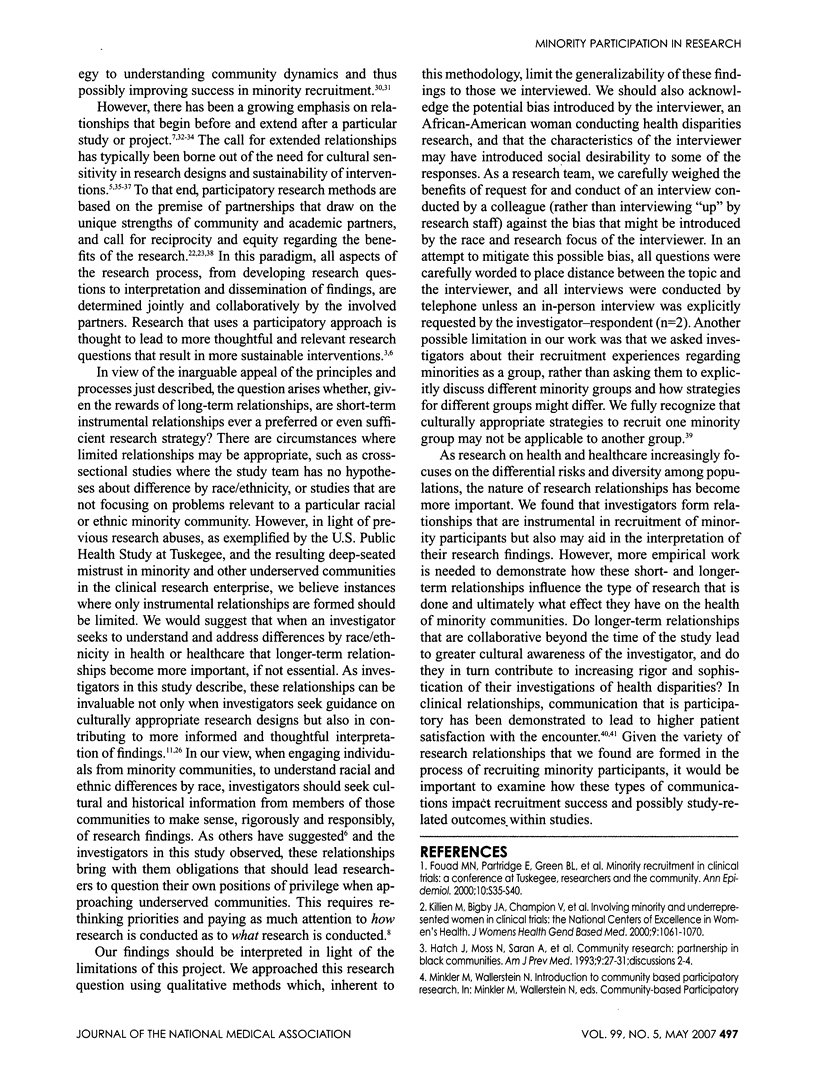
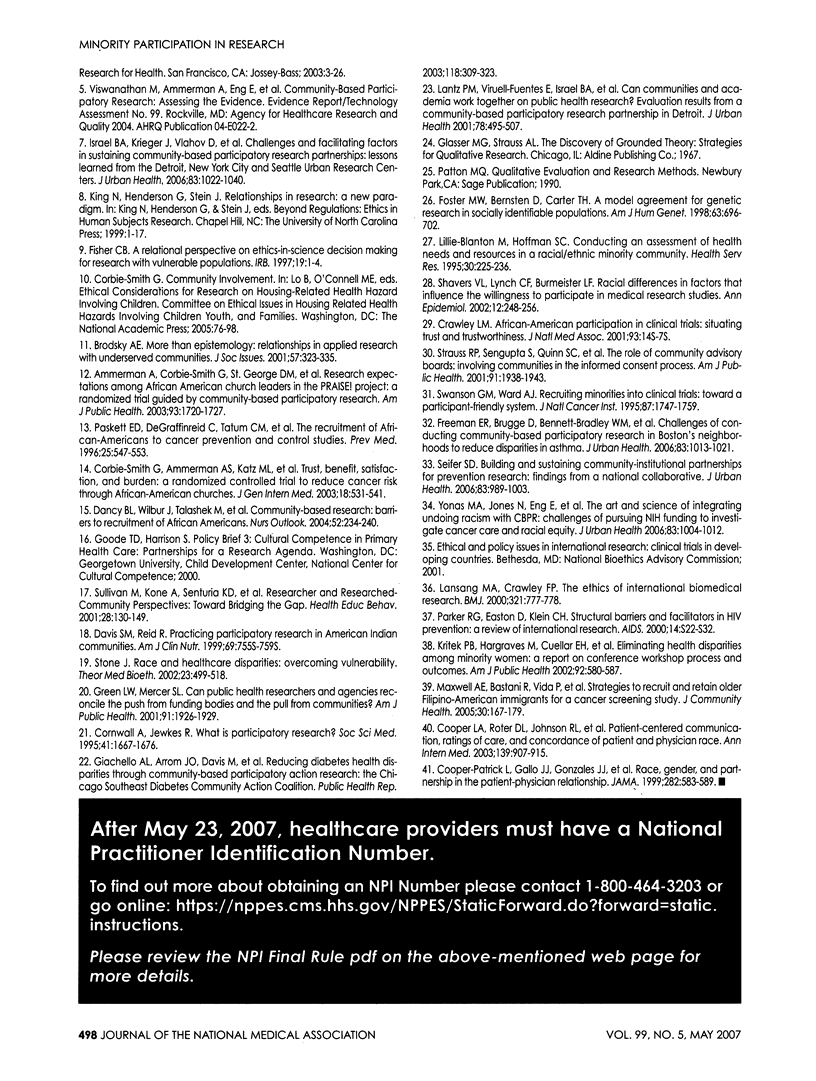
Selected References
These references are in PubMed. This may not be the complete list of references from this article.
- Ammerman Alice, Corbie-Smith Giselle, St George Diane Marie M., Washington Chanetta, Weathers Beneta, Jackson-Christian Bethany. Research expectations among African American church leaders in the PRAISE! project: a randomized trial guided by community-based participatory research. Am J Public Health. 2003 Oct;93(10):1720–1727. doi: 10.2105/ajph.93.10.1720. [DOI] [PMC free article] [PubMed] [Google Scholar]
- Cooper-Patrick L., Gallo J. J., Gonzales J. J., Vu H. T., Powe N. R., Nelson C., Ford D. E. Race, gender, and partnership in the patient-physician relationship. JAMA. 1999 Aug 11;282(6):583–589. doi: 10.1001/jama.282.6.583. [DOI] [PubMed] [Google Scholar]
- Cooper Lisa A., Roter Debra L., Johnson Rachel L., Ford Daniel E., Steinwachs Donald M., Powe Neil R. Patient-centered communication, ratings of care, and concordance of patient and physician race. Ann Intern Med. 2003 Dec 2;139(11):907–915. doi: 10.7326/0003-4819-139-11-200312020-00009. [DOI] [PubMed] [Google Scholar]
- Corbie-Smith Giselle, Ammerman Alice S., Katz Mira L., St George Diane Marie M., Blumenthal Connie, Washington Chanetta, Weathers Benita, Keyserling Thomas C., Switzer Boyd. Trust, benefit, satisfaction, and burden: a randomized controlled trial to reduce cancer risk through African-American churches. J Gen Intern Med. 2003 Jul;18(7):531–541. doi: 10.1046/j.1525-1497.2003.21061.x. [DOI] [PMC free article] [PubMed] [Google Scholar]
- Cornwall A., Jewkes R. What is participatory research? Soc Sci Med. 1995 Dec;41(12):1667–1676. doi: 10.1016/0277-9536(95)00127-s. [DOI] [PubMed] [Google Scholar]
- Crawley L. M. African-American participation in clinical trials: situating trust and trustworthiness. J Natl Med Assoc. 2001 Dec;93(12 Suppl):14S–17S. [PMC free article] [PubMed] [Google Scholar]
- Dancy Barbara L., Wilbur Joellen, Talashek Marie, Bonner Gloria, Barnes-Boyd Cynthia. Community-based research: barriers to recruitment of African Americans. Nurs Outlook. 2004 Sep-Oct;52(5):234–240. doi: 10.1016/j.outlook.2004.04.012. [DOI] [PubMed] [Google Scholar]
- Fisher Celia B. A relational perspective on ethics-in-science decisionmaking for research with vulnerable populations. IRB. 1997 Sep-Oct;19(5):1–4. [PubMed] [Google Scholar]
- Foster M. W., Bernsten D., Carter T. H. A model agreement for genetic research in socially identifiable populations. Am J Hum Genet. 1998 Sep;63(3):696–702. doi: 10.1086/302013. [DOI] [PMC free article] [PubMed] [Google Scholar]
- Fouad M. N., Partridge E., Green B. L., Kohler C., Wynn T., Nagy S., Churchill S. Minority recruitment in clinical trials: a conference at Tuskegee, researchers and the community. Ann Epidemiol. 2000 Nov;10(8 Suppl):S35–S40. doi: 10.1016/s1047-2797(00)00199-x. [DOI] [PubMed] [Google Scholar]
- Freeman Elmer R., Brugge Doug, Bennett-Bradley Willie Mae, Levy Jonathan I., Carrasco Edna Rivera. Challenges of conducting community-based participatory research in Boston's neighborhoods to reduce disparities in asthma. J Urban Health. 2006 Nov;83(6):1013–1021. doi: 10.1007/s11524-006-9111-0. [DOI] [PMC free article] [PubMed] [Google Scholar]
- Giachello Aida L., Arrom Jose O., Davis Margaret, Sayad Judith V., Ramirez Dinah, Nandi Chandana, Ramos Catalina, Chicago Southeast Diabetes Community Action Coalition Reducing diabetes health disparities through community-based participatory action research: the Chicago Southeast Diabetes Community Action Coalition. Public Health Rep. 2003 Jul-Aug;118(4):309–323. doi: 10.1016/S0033-3549(04)50255-8. [DOI] [PMC free article] [PubMed] [Google Scholar]
- Green L. W., Mercer S. L. Can public health researchers and agencies reconcile the push from funding bodies and the pull from communities? Am J Public Health. 2001 Dec;91(12):1926–1929. doi: 10.2105/ajph.91.12.1926. [DOI] [PMC free article] [PubMed] [Google Scholar]
- Israel Barbara A., Krieger James, Vlahov David, Ciske Sandra, Foley Mary, Fortin Princess, Guzman J. Ricardo, Lichtenstein Richard, McGranaghan Robert, Palermo Ann-Gel. Challenges and facilitating factors in sustaining community-based participatory research partnerships: lessons learned from the Detroit, New York City and Seattle Urban Research Centers. J Urban Health. 2006 Nov;83(6):1022–1040. doi: 10.1007/s11524-006-9110-1. [DOI] [PMC free article] [PubMed] [Google Scholar]
- Killien M., Bigby J. A., Champion V., Fernandez-Repollet E., Jackson R. D., Kagawa-Singer M., Kidd K., Naughton M. J., Prout M. Involving minority and underrepresented women in clinical trials: the National Centers of Excellence in Women's Health. J Womens Health Gend Based Med. 2000 Dec;9(10):1061–1070. doi: 10.1089/152460900445974. [DOI] [PubMed] [Google Scholar]
- Kritek Phyllis Beck, Hargraves Martha, Cuellar Ernestine H., Dallo Florence, Gauthier Donna M., Holland Christi A., Ilkiw Connie, Swanson Jane W., Swanson Reid. Eliminating health disparities among minority women: a report on conference workshop process and outcomes. Am J Public Health. 2002 Apr;92(4):580–587. doi: 10.2105/ajph.92.4.580. [DOI] [PMC free article] [PubMed] [Google Scholar]
- Lansang M. A., Crawley F. P. The ethics of international biomedical research. BMJ. 2000 Sep 30;321(7264):777–778. doi: 10.1136/bmj.321.7264.777. [DOI] [PMC free article] [PubMed] [Google Scholar]
- Lantz P. M., Viruell-Fuentes E., Israel B. A., Softley D., Guzman R. Can communities and academia work together on public health research? Evaluation results from a community-based participatory research partnership in Detroit. J Urban Health. 2001 Sep;78(3):495–507. doi: 10.1093/jurban/78.3.495. [DOI] [PMC free article] [PubMed] [Google Scholar]
- Lillie-Blanton M., Hoffman S. C. Conducting an assessment of health needs and resources in a racial/ethnic minority community. Health Serv Res. 1995 Apr;30(1 Pt 2):225–236. [PMC free article] [PubMed] [Google Scholar]
- Maxwell Annette E., Bastani Roshan, Vida Perlaminda, Warda Umme S. Strategies to recruit and retain older Filipino-American immigrants for a cancer screening study. J Community Health. 2005 Jun;30(3):167–179. doi: 10.1007/s10900-004-1956-0. [DOI] [PMC free article] [PubMed] [Google Scholar]
- Parker R. G., Easton D., Klein C. H. Structural barriers and facilitators in HIV prevention: a review of international research. AIDS. 2000 Jun;14 (Suppl 1):S22–S32. doi: 10.1097/00002030-200006001-00004. [DOI] [PubMed] [Google Scholar]
- Seifer Sarena D., Examining Community-Institutional Partnerships for Prevention Research Group Building and sustaining community-institutional partnerships for prevention research: findings from a national collaborative. J Urban Health. 2006 Nov;83(6):989–1003. doi: 10.1007/s11524-006-9113-y. [DOI] [PMC free article] [PubMed] [Google Scholar]
- Shavers Vickie L., Lynch Charles F., Burmeister Leon F. Racial differences in factors that influence the willingness to participate in medical research studies. Ann Epidemiol. 2002 May;12(4):248–256. doi: 10.1016/s1047-2797(01)00265-4. [DOI] [PubMed] [Google Scholar]
- Stone John. Race and healthcare disparities: overcoming vulnerablity. Theor Med Bioeth. 2002;23(6):499–518. doi: 10.1023/a:1021524431845. [DOI] [PubMed] [Google Scholar]
- Strauss R. P., Sengupta S., Quinn S. C., Goeppinger J., Spaulding C., Kegeles S. M., Millett G. The role of community advisory boards: involving communities in the informed consent process. Am J Public Health. 2001 Dec;91(12):1938–1943. doi: 10.2105/ajph.91.12.1938. [DOI] [PMC free article] [PubMed] [Google Scholar]
- Sullivan M., Kone A., Senturia K. D., Chrisman N. J., Ciske S. J., Krieger J. W. Researcher and researched--community perspectives: toward bridging the gap. Health Educ Behav. 2001 Apr;28(2):130–149. doi: 10.1177/109019810102800202. [DOI] [PubMed] [Google Scholar]
- Swanson G. M., Ward A. J. Recruiting minorities into clinical trials: toward a participant-friendly system. J Natl Cancer Inst. 1995 Dec 6;87(23):1747–1759. doi: 10.1093/jnci/87.23.1747. [DOI] [PubMed] [Google Scholar]
- Yonas Michael A., Jones Nora, Eng Eugenia, Vines Anissa I., Aronson Robert, Griffith Derek M., White Brandolyn, DuBose Melvin. The art and science of integrating Undoing Racism with CBPR: challenges of pursuing NIH funding to investigate cancer care and racial equity. J Urban Health. 2006 Nov;83(6):1004–1012. doi: 10.1007/s11524-006-9114-x. [DOI] [PMC free article] [PubMed] [Google Scholar]


